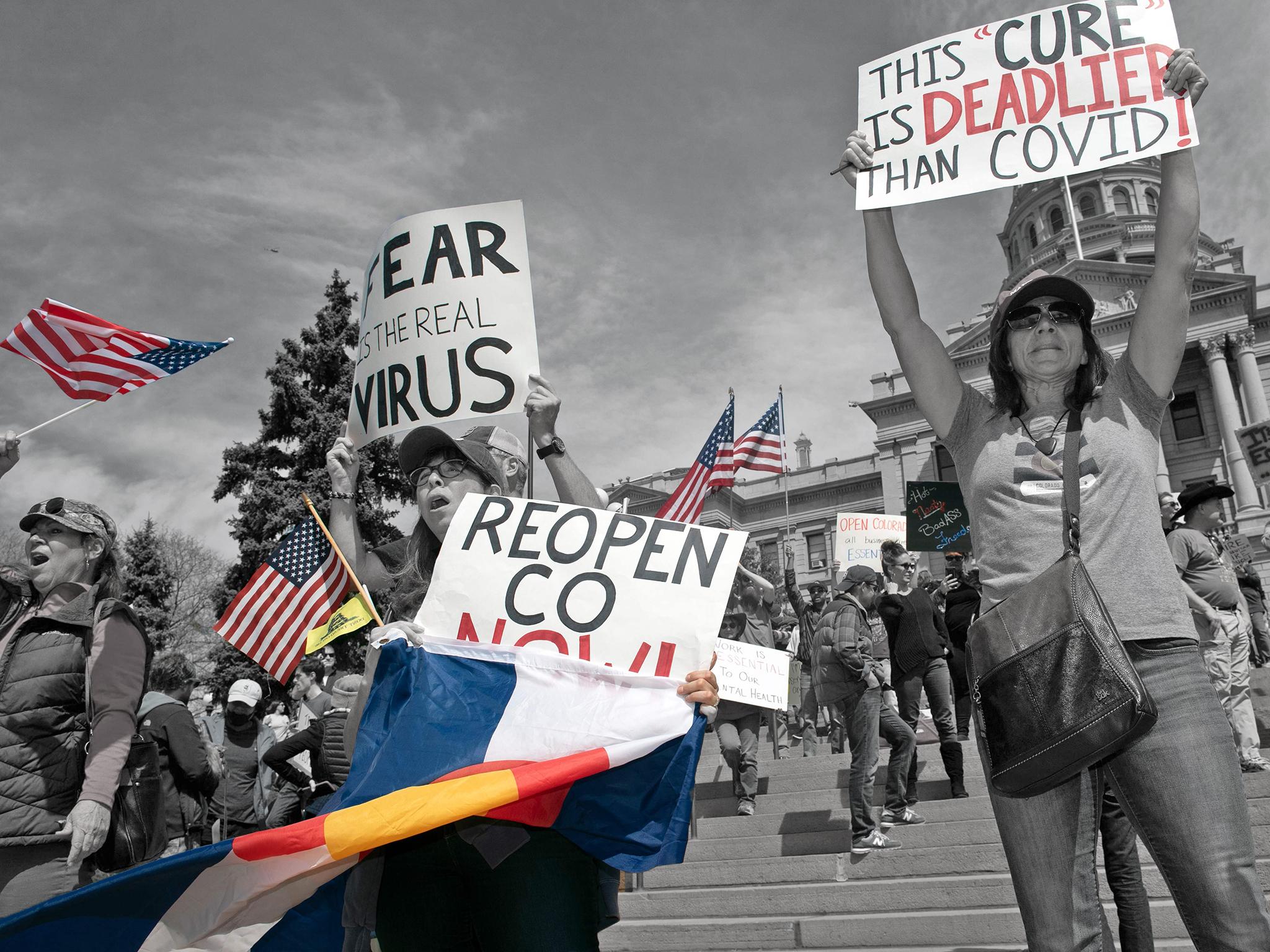The Independent's journalism is supported by our readers. When you purchase through links on our site, we may earn commission.
As Bethany Mandel's 'grandma killer' tweet proves, vice-signaling is the right's newest and most toxic trend
The polar opposite to 'woke' left-wing virtue-signaling, this call to callousness and Darwinism has begun to take over conservative thinking


"You can call me a Grandma killer," conservative writer and editor Bethany Mandel declared on Twitter. "I'm not sacrificing my home, food on the table, all of our docs and dentists, every form of pleasure (museums, zoos, restaurants), all my kids' teachers in order to make other people comfortable. If you want to stay locked down, do. I'm not."
It's startling to see someone boast in public about how they are willing to sacrifice others’ loved ones for a trip to the zoo. But it's not exactly uncommon.
During the pandemic, conservatives have repeatedly and publicly trumpeted their disregard for the lives of the old and the sick. Historian and writer David Perry has called this kind of public callousness "vice-signaling": a public display of immorality, intended to create a community based on cruelty and disregard for others, which is proud of it at the same time. It is, essentially, the polar opposite to “woke” left-wing virtue-signaling.
The right's embrace of vice-signaling, and indeed of vice, is how we got Trump. It's also why his administration has been so unable to deal with a crisis requiring collective civic virtue.
Conservatives have long embraced a kind of tough-love, individualistic ethos which trumpets callousness as a good in itself. They have attacked "bleeding heart" liberals for decades for the moral sin of caring about people who are suffering, and for thinking that collectively we should try to address injustice and inequality, rather than submitting to economic Darwinism.
Little wonder, then, that the right weaponized the term “virtue-signaling" over the past few years. The phrase is now used to sneer at anyone who expresses public concern about sexism, racism, homophobia, poverty, or bigotry of any sort. If you ask someone not to use a racial slur, or not to misgender someone, you are supposedly engaged in “virtue-signaling”— which is to say, that you are only objecting to cruelty because you want other people to like you or admire you. The term “virtue-signaling" assumes that anyone who speaks about the value of virtue is hypocritical and self-aggrandizing.
But virtue is about how you treat other people. To create virtuous communities, you need to talk about what it means to be good. Labeling virtue talk as bad means you're rejecting the pursuit of virtue as a goal.
The right has in fact in many ways rejected the pursuit of virtue. Instead, they have chosen to create communities tied together with virtue's opposite. Conservative thinkers and pundits today frequently insist that reality does not have any place for communal and collective good, and instead call on people to admit, or even revel in, openly callous and bloodthirsty expressions of hatred or immorality.
The most extreme example of this comes, as usual, from radio show conspiracy theorist Alex Jones. Jones recently said that if there were coronavirus food shortages, he would eat his neighbors in order to feed his children.
But the vice-signaler-in-chief is, of course, Donald Trump. When the 45th president initially refused to condemn neo-Nazis rioting in Charlottesville, VA, in 2017, treating the request to condemn evil as some sort of trick, he earned that title.
An NBC reporter named Peter Alexander in a press briefing in March practically begged Trump to virtue-signal, asking him if he could offer people reassurance during the crisis: "What do you say to Americans who are watching you right now, who are scared?” he asked. Trump refused the opportunity to utter some words of comfort, instead launching into a tirade in which he said the journalist was a "terrible reporter" and that it was a "very nasty question." Rather than talk about virtue, and encourage people to be virtuous, Trump invariably urges people to be callous, angry and afraid.
A public health crisis requires public, collective action for good. To survive Covid-19, we need people to join together and make sacrifices for a collective good. We need a government willing to acknowledge those sacrifices and enact policies to make them less onerous. We need, in short, a vision of, and a commitment to, communal good.
But the Republican Party has spent the past few decades, and the past three years especially, hollowing out the language of collective virtue and replacing it with the strange, stunted language of individual vice. Some signs at conservative anti-lockdown protests are positively belligerent in their pettiness. "I need a haircut," one sign read. "Let my people golf!" declared another.
Like Mandel's demand to visit museums and zoos, these people are proud to say that their passing discomfort is more important than the lives of others, or of others’ loved ones. They are vice-signaling to get accolades from their conservative peers, who think that it is the height of morality not to care about other people at all.
Conservatives often frame their vice-signaling as hard-headed truth-telling. Alex Jones claimed, "My superpower is being honest!”— as if violent fantasies of torture and death reveal the true reality, and people who have objections to eating human flesh are merely whiney virtue-signalers.
The real hard truth, though, is that virtue is as necessary to us as food; without it, as the coronavirus is demonstrating, we can't survive. The Trump administration has repeatedly chosen cronyism over efficiency in coronavirus response. The Republican Party has dragged its feet on aid to state and local governments, for essentially no reason other than its knee-jerk opposition to helping people. The result has been, and will continue to be, unnecessary death and unnecessary hardship.
Vice-signaling is not only a call to immorality. It's a call to death. People of goodwill during this crisis are not only fighting the virus. They're also fighting Trump and the conservative movement, which has decided, horribly, that they love vice more than they love life.
Join our commenting forum
Join thought-provoking conversations, follow other Independent readers and see their replies
Comments
Bookmark popover
Removed from bookmarks